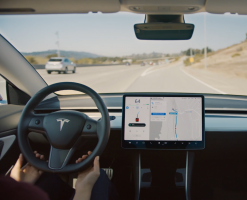
— Tesla has lost a legal battle in Connecticut over the right to sell vehicles direct to consumers as a judge ruled in favor of the Department of Motor Vehicles (DMV) and the Connecticut Automotive Retailers Association.
According to Connecticut law, “(n)o person, firm or corporation may engage in the business of . . . selling [or] offering for sale . . . any motor vehicle . . . without having been issued . . . a new car dealer's . . . license.”
In July 2016, the Connecticut Automotive Retailers Association filed a petition for the DMV to declare Tesla's Greenwich gallery illegal, causing the automaker to intervene and testify at a hearing conducted by an officer with the DMV in January 2017.
In April 2017, the hearing officer told Tesla to cease operations at the Greenwich location because the automaker didn't hold a dealer license as required by law.
In return, Tesla filed suit against the DMV by alleging a franchised dealer license isn't required because the automaker uses the location to educate consumers about the benefits of Tesla vehicles and to display those vehicles for the public to see.
In addition, the automaker says the location doesn't sell vehicles direct to consumers as the public must place orders online or at Tesla stores in other states. However, consumers were not allowed to place online orders from within the Greenwich store.
Tesla says evidence shows no vehicle sales take place and no binding orders are made in Greenwich, alleged proof Tesla is not in the business of selling vehicles at that location.
But the judge ruled Tesla's business model in Greenwich is a perfect example of a store that needs a dealer license. There is a store manager, “product specialists” and “owner advisors."
Those advisors receive commissions and bonuses “tied to the number of ‘Gallery’ visitors who later purchased a vehicle, a practice which stopped at the end of 2016 after [the association] petition was filed.” According to the judge, payments of bonuses and commissions were “consistent with those employees who operated out of licensed locations.”
Furthermore, Tesla vehicles could be inspected at the gallery and “test drives were available for interested drivers.” However, Tesla employees were told no vehicle orders could be placed at the Greenwich location.
In his ruling, Superior Court Judge Joseph Shortall wrote, “If Tesla was not engaged in the business of selling motor vehicles at the gallery, it’s difficult to see what it was engaged in at that location.”
“Tesla travels far beyond the boundaries of constitutionally protected commercial speech when its employees arrange for test drives of the same type of vehicles as are on display at the Gallery, assist Gallery visitors in configuring the vehicle they wish to buy on a computer terminal in the Gallery and saving it to the Tesla website as ‘My Tesla,’ available for later purchase, and/or searching the Tesla inventory of vehicles already manufactured and available for purchase." - Judge Shortall
Tesla has faced legal challenges in the past, winning some but as in Connecticut, losing a few. The automaker hasn't indicated if it plans on appealing the ruling.




